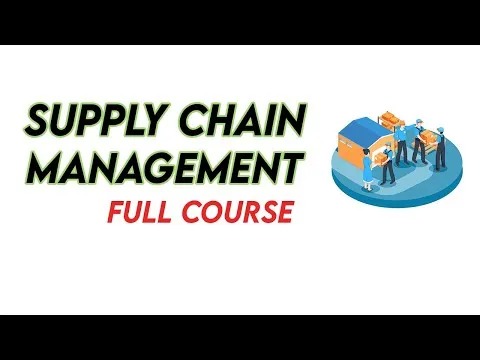
Supply Chain Management Tools and Techniques 
This course is part of the edX Professional Certificate program Certified Supply Chain Analyst (CSCA), offered by ISCEA. It provides learners with the tools and techniques necessary to become an ISCEA Certified Supply Chain Analyst (CSCA). The course covers topics such as supply chain management, inventory management, and logistics. It is designed to help learners prepare for the ISCEA CSCA Exam on edX. ▼
ADVERTISEMENT
Course Feature
![]() Cost:
Cost:
Free
![]() Provider:
Provider:
Edx
![]() Certificate:
Certificate:
Paid Certification
![]() Language:
Language:
English
![]() Start Date:
Start Date:
Self paced
Course Overview
❗The content presented here is sourced directly from Edx platform. For comprehensive course details, including enrollment information, simply click on the 'Go to class' link on our website.
Updated in [March 06th, 2023]
This course, Supply Chain Management Tools and Techniques, is part of the edX Professional Certificate program Certified Supply Chain Analyst (CSCA), offered by ISCEA. It is designed to provide a broad set of tools currently used in the industry to make their supply chains efficient and competitive. The course covers topics such as Sales Order Fulfillment and Aggregate Planning, Lean and Six Sigma, sustainability, life cycle analysis, environmental considerations, customer-supplier relationships, and best practices for engaging with customers. Successful completion of this course, along with the other two preparatory courses, is a requirement for becoming ISCEA certified.
[Applications]
Upon completion of this course, participants can apply the knowledge and skills acquired to improve their supply chain operations. They can use the tools and techniques learned to develop strategies for sales order fulfillment, aggregate planning, and lean and six sigma. Participants can also apply the concepts of sustainability and customer-supplier relationships to their supply chain operations. Additionally, they can use the best practices for engaging with customers to build strong customer relationships.
[Career Paths]
1. Supply Chain Manager: Supply chain managers are responsible for overseeing and managing the entire supply chain process. They are responsible for ensuring that the supply chain runs smoothly and efficiently, and that all stakeholders are satisfied. They must be able to identify and address any issues that arise, and develop strategies to improve the supply chain. As the demand for more efficient and cost-effective supply chains increases, the need for supply chain managers with the knowledge and skills to manage these processes is growing.
2. Logistics Manager: Logistics managers are responsible for overseeing the transportation and storage of goods. They must be able to plan and coordinate the movement of goods from one location to another, and ensure that the goods are delivered on time and in good condition. They must also be able to identify and address any issues that arise during the transportation process. As the demand for more efficient and cost-effective logistics increases, the need for logistics managers with the knowledge and skills to manage these processes is growing.
3. Inventory Manager: Inventory managers are responsible for overseeing the inventory of goods. They must be able to plan and coordinate the movement of goods from one location to another, and ensure that the inventory is accurate and up-to-date. They must also be able to identify and address any issues that arise during the inventory process. As the demand for more efficient and cost-effective inventory management increases, the need for inventory managers with the knowledge and skills to manage these processes is growing.
4. Sustainability Manager: Sustainability managers are responsible for overseeing the sustainability of the supply chain. They must be able to identify and address any environmental issues that arise, and develop strategies to reduce the environmental impact of the supply chain. As the demand for more sustainable supply chains increases, the need for sustainability managers with the knowledge and skills to manage these processes is growing.
[Education Paths]
1. Bachelor of Science in Supply Chain Management: This degree program provides students with a comprehensive understanding of the principles and practices of supply chain management. Students learn about the various aspects of supply chain management, such as logistics, inventory management, procurement, and operations. They also gain an understanding of the latest technologies and trends in the field, such as artificial intelligence, blockchain, and big data analytics.
2. Master of Science in Supply Chain Management: This degree program provides students with an advanced understanding of the principles and practices of supply chain management. Students learn about the various aspects of supply chain management, such as logistics, inventory management, procurement, and operations. They also gain an understanding of the latest technologies and trends in the field, such as artificial intelligence, blockchain, and big data analytics.
3. Doctor of Philosophy in Supply Chain Management: This degree program provides students with an in-depth understanding of the principles and practices of supply chain management. Students learn about the various aspects of supply chain management, such as logistics, inventory management, procurement, and operations. They also gain an understanding of the latest technologies and trends in the field, such as artificial intelligence, blockchain, and big data analytics.
4. Master of Business Administration in Supply Chain Management: This degree program provides students with a comprehensive understanding of the principles and practices of supply chain management. Students learn about the various aspects of supply chain management, such as logistics, inventory management, procurement, and operations. They also gain an understanding of the latest technologies and trends in the field, such as artificial intelligence, blockchain, and big data analytics. Additionally, students learn about the business aspects of supply chain management, such as finance, marketing, and strategy.
Course Provider

Provider Edx's Stats at AZClass
Supply Chain Management Tools and Techniques is part of the edX Professional Certificate Program Certified Supply Chain Analyst offered by ISCEA. It equips learners with the tools and techniques needed to become an ISCEA Certified Supply Chain Analyst. The course covers topics such as supply chain management, inventory management and logistics. They will also study Lean and Six Sigma, sustainability in supply chains, life cycle analysis and environmental considerations. Finally, learners will gain an in-depth understanding of customer-supplier relationships and best practices for interacting with customers.
Discussion and Reviews
0.0 (Based on 0 reviews)
Explore Similar Online Courses

Business and Technology

Become a Master at Conflict Management at Home or Work

Python for Informatics: Exploring Information

Social Network Analysis

Introduction to Systematic Review and Meta-Analysis

The Analytics Edge

DCO042 - Python For Informatics

Causal Diagrams: Draw Your Assumptions Before Your Conclusions

Whole genome sequencing of bacterial genomes - tools and applications

MIT Free Supply Chain Management Courses

What Are Good Supply Chain Certifications?


Start your review of Supply Chain Management Tools and Techniques